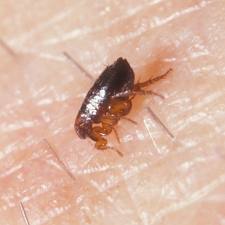If you’re dog or cat is particularly itchy and scratchy, 80% of the time it is due to fleas.
Who am I?
I am small, (1.5 to 3mm long). I have 6 legs. I can jump vertically up to 7 inches and horizontally up to 13 inches. I lay around 50 eggs a day and my favourite food is blood! Have you got it yet?
I’m a flea!!!
Understand Your Victim
The only conversation most people like to have on fleas is how to kill them, don’t worry we’ll get to that, but it’s easier to plan an assassination when you understand your victim.
So let’s look at a few flea facts that will ensure your plan of attack is fool-proof and flea-proof.
Where’s the problem?
95% of the flea infestation is in your pet’s environment in the form of eggs, larvae and pupae. This leaves only 5% of the problem to be seen on your pet. Scary!
Fleas are agile but lazy
Although fleas are crazy agile, they rarely jump from animal to animal. They tend to live, feed and breed on the one host. This means infestation spreads to other household pets from eggs hatching in the environment and the young flea jumping aboard the passing meals-on-paws.
Fleas are a breeding machine
The average lifespan of an adult flea is 100 days. If a flea can lay 50 eggs a day, that’s 5000 eggs in its lifetime!
Fleas over-indulge
Fleas consume 15 times their own body weight in blood every day. Cases of anaemia are seen in pets suffering a bad infestation. Kittens and puppies are especially vulnerable.
Sun-loving insects
Eggs hatch more readily in warm temperatures, so don’t be alarmed to see more fleas about in the summer months.
Sickly saliva
Flea saliva has an anticoagulant agent in it that can cause an allergic reaction in cats and dogs. We call this condition flea-allergy-dermatitis. Pets suffering flea allergy dermatitis may have balding patches of red, irritated, itchy skin.
A Cat-flea on a dog-flea?
There are thousands of flea species throughout the world. The main species found in Australia is the cat-flea. But don’t be fooled, 95% of the fleas found on dogs are cat-fleas. They will also feed on humans if given the chance!
Peephole
Let your dog see past their yard. Some dogs enjoy knowing what is going on around them. Providing a peephole in the fence can give your dog plenty of entertainment watching people, dogs and other interesting things go by.

So how do we get rid of these pesky fleas?
- Step 1
- Step 2
- Step 3
Continue monthly treatment with a spot-on for a consecutive 6 months. This is how long flea eggs can lay dormant for. (To be safe, you can use a spot-on treatment monthly on your pet for life).
- Step 4
- Step 5
If infestation is bad, flea bomb the inside of the house (Pets outside when you do this please).
What's Next?
Unfortunately there is no vaccination for fleas… wouldn’t that be nice! As soon as one becomes available, we’ll be the first to let you know.
In the mean time, if you do find yourself with a dreaded flea infestation, come see our friendly faces at Familypet Vet and we will help design your own personal flea assassination plan.

